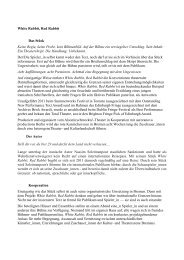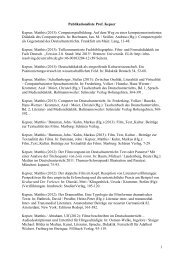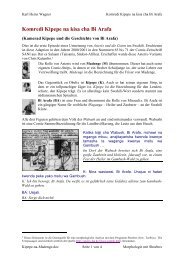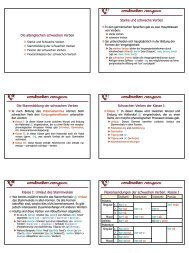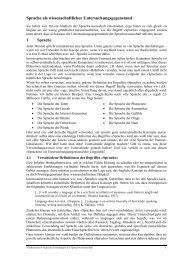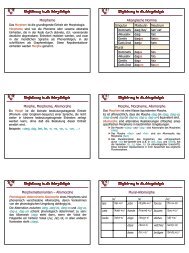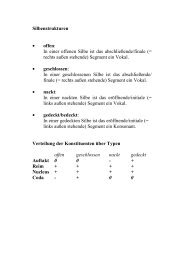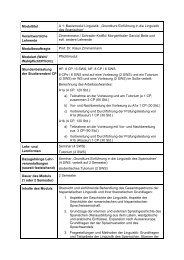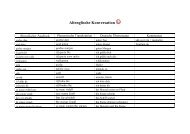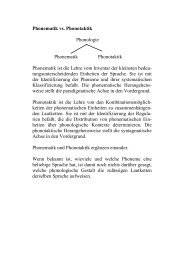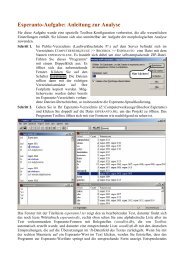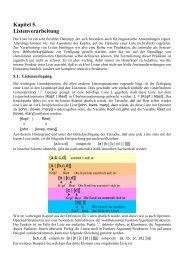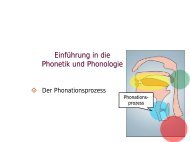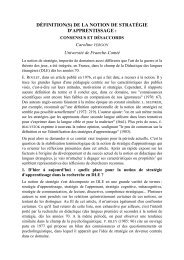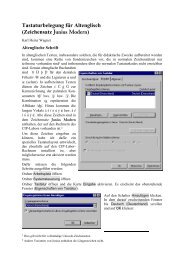Relativism and Universalism in Linguistics - Fachbereich 10 ...
Relativism and Universalism in Linguistics - Fachbereich 10 ...
Relativism and Universalism in Linguistics - Fachbereich 10 ...
Create successful ePaper yourself
Turn your PDF publications into a flip-book with our unique Google optimized e-Paper software.
182 Workshops<br />
identify a class of <strong>in</strong>def<strong>in</strong>ite Cs (typically <strong>in</strong>terrogative ones), along with a class of def<strong>in</strong>ite Cs<br />
(typically declarative ones).<br />
Complementizer selection then shows that, at least <strong>in</strong> subord<strong>in</strong>at<strong>in</strong>g languages,<br />
complementation is best characterized <strong>in</strong> terms of formal features which account for common<br />
patterns, despite apparent differences which can be restricted to the lexicon. At the same time<br />
it allows to draw on the similarities between Cs <strong>and</strong> determ<strong>in</strong>er-like elements, such as<br />
pronouns, show<strong>in</strong>g that there is a further cross-l<strong>in</strong>guistic unification which can be best<br />
expressed <strong>in</strong> term of features.<br />
Constra<strong>in</strong>ed <strong>Relativism</strong> Is Noth<strong>in</strong>g but Implicit <strong>Universalism</strong><br />
Struckmeier, Volker<br />
University of Cologne<br />
volker.struckmeier@uni-koeln.de<br />
Accord<strong>in</strong>g to the crude version of relativism outl<strong>in</strong>ed <strong>in</strong> the conference proposal, languages<br />
should differ from one another because extral<strong>in</strong>guistic factors make them differ. However,<br />
this view may conta<strong>in</strong> a conceptual fallacy. The discipl<strong>in</strong>e of l<strong>in</strong>guistics has developed<br />
various models <strong>and</strong> theories that would seem to constra<strong>in</strong> the degree to which languages can<br />
actually differ for language-external reasons, namely quite simply the degree to which<br />
language-<strong>in</strong>ternal considerations force them to be similar to one another. It is immediately<br />
obvious, that any relativist theory that allows for restrictions (e.g. of the formalist or the<br />
functionalist type) on the variability of languages falls short of a complete description of<br />
language: While some portions of language can be shown to vary, others will unavoidably fall<br />
<strong>in</strong>to the doma<strong>in</strong> of universalist necessity.<br />
I will show that the typology of sentence types can cover yet one more semantico-syntactic<br />
phenomenon, namely the possibility to express attribution. I will present a common<br />
morphosyntactic structure for attributes <strong>in</strong> German, which is <strong>in</strong> effect structurally parallel to a<br />
relative clause. Attributes <strong>in</strong> German, then, constitute noth<strong>in</strong>g but yet one more sentence type.<br />
This sentence type is to be expected on formalist grounds, because it comprises no new<br />
mach<strong>in</strong>ery whatsoever <strong>and</strong> should thus arise from the free “t<strong>in</strong>ker<strong>in</strong>g” of a m<strong>in</strong>imalist syntax<br />
left to play. My representation also allows for a semantic analysis that regards attribution as<br />
an expectable (if not necessary) k<strong>in</strong>d of structure <strong>in</strong> so far as it completes a system of<br />
“reference types”. This semantic representation might, I suppose, just as well be re<strong>in</strong>terpreted<br />
as a piece of functionalist evidence to the effect that languages might differ <strong>in</strong> morphosyntactic<br />
realizations for a given semantic operation, but not <strong>in</strong> the set of the semantic<br />
operations that these realizations serve to express. As the system of reference types also<br />
<strong>in</strong>clude predicative <strong>and</strong> referential structures, the major l<strong>in</strong>guistic operations constitute<br />
conceptually necessary pieces of a system ou tout se tient from both a formalist <strong>and</strong><br />
functionalist perspective.<br />
It can be claimed, then, that attributive, predicative <strong>and</strong> referential structures constitute<br />
someth<strong>in</strong>g we can expect from any <strong>and</strong> all languages. Typological <strong>in</strong>vestigations seem to<br />
support this assumption <strong>in</strong> that all languages cater for these necessities <strong>in</strong> some way. If this is<br />
<strong>in</strong>deed the case, the question of relativism vs. universalism boils down to a much more<br />
modest (if somewhat malevolent) question: Given that universalism seems to be a logical<br />
necessity for major l<strong>in</strong>guistic operations, what is actually left for a relativist theory to decide?<br />
To put it the other way round: If the relativist position cannot provide a substantial set of<br />
phenomena that are actually variable <strong>in</strong> the languages of the world, it actually amounts to<br />
noth<strong>in</strong>g more than a description of the periphery that surrounds the universalist grammar it<br />
then logically implies.



